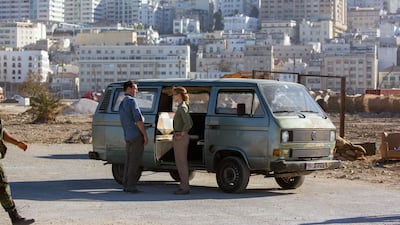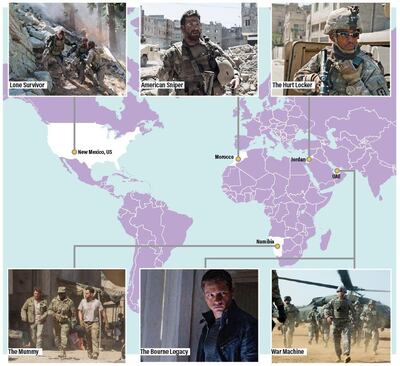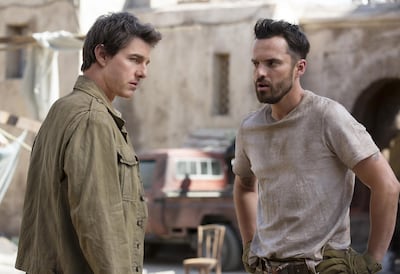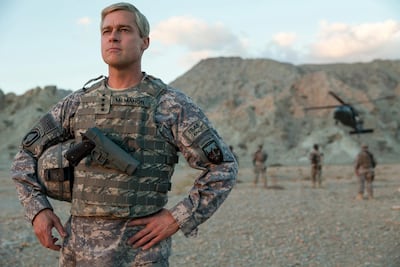When Netflix announced earlier this year that it was preparing to shoot its first original drama in the region, there was plenty of excitement from fans and the industry alike. The paranormal drama Jinn will be set in the region, and shot in the region, using local cast and crew. Very Big Shot director Mir-Jean Bou Chaaya and Theeb scribe Bassel Ghandour have already signed on, though the project remains in development.
There were some rolling eyes among the local industry, though, when more recently, Netflix announced its new original series Messiah. The show follows a mysterious man who emerges in the Middle East claiming to be the Messiah and quickly attracts a growing band of followers. It will film in New Mexico in the United States. The sense of missed opportunity to shoot a major production here is evident, especially after Netflix has stated a desire to shoot more regional content, specifically in the Middle East.
It has a show set in the Middle East, existing partners in the region eager to bring production here, and sadly, it chooses to shoot in New Mexico.
We shouldn't be too harsh on Netflix, though. The show's creators are US-based writer and producer team Michael Petroni and Mark Burnett, and let's be honest – it's hardly unusual for big productions to shoot with one location deputising for another. Vancouver, for example, dubbed "the Hollywood of the North" has become something of a "North American City 101" for the movie industry, thanks to its excellent facilities (the biggest studio infrastructure in North America outside Hollywood) and attractive pricing compared to its southern neighbour. Vancouver has stood in for almost any American city you can think of, including San Francisco (Big Eyes), Los Angeles (Marmaduke), and New York (The Interview). In fact, in The Interview, Vancouver had the (surely unique) honour of standing in for both New York and Pyongyang.
Finance
There are a number of reasons why the producers of a movie or TV show may choose to deputise one location for another when shooting, but perhaps the most common reason is finance. With a limited budget and a huge crew and cast to move around, accommodate, feed and film, tough decisions have to be made. If a Hollywood-based film crew requires a Middle Eastern desert setting, they have two main choices. Fly all the crew and cast to the Middle East, a relatively unknown quantity to most US producers, and an expensive, logistically tough feat in itself, or go next door to more familiar deserts in Nevada or New Mexico. The latter is often both easier and cheaper.
While certain locations in the Middle East, such as Egypt or Morocco, might be able to counter some of the costs of relocating a shoot there through low overheads and cheaper labour costs, others, such as the UAE, where wages in skilled jobs are high and accommodation costs are comparable to western locations, cannot.
Incentives
Of course, Middle Eastern governments have taken note of this situation. It's for this reason that Abu Dhabi introduced its 30 per cent rebate scheme for international productions shooting in the emirate, as well as offering various practical and logistical support through twofour54. The move has had some successes – most notably bringing huge shoots such as Star Wars: The Force Awakens and FF7 to the Emirate.
Dubai doesn't have a rebate scheme as such, though its Film and TV Commission also offers practical support to incoming productions, such as Star Trek Beyond and Mission Impossible: Rogue Nation. It also offers to find incoming crews attractive rates on accommodation and other capital costs.
It's not only the UAE that wants to bring international shoots to the region. Morocco also offers a 20 per cent cash rebate, and represents a major challenge to the UAE in light of its already low overheads. Morocco ultimately won locations for Burn Country (also known as The Fixer), and, to many people's dismay, this year's Beirut, which by all logical assumptions could have filmed in Beirut. After a pan-regional tussel for 2017's The Mummy, the film was shot in Namibia.
With Saudi Arabia now on the prowl for incoming production spend, too, with its debut Cannes Pavilion and a super-generous 35 per cent rebate on offer, competition is only getting tougher.
Practicality
Another reason for relocating shoots is simple practicality. There has been no shortage of films set in war-torn Iraq or Afghanistan in recent years, but only the most dedicated or foolhardy director would attempt to airlift his cast and crew into a war zone for the sake of authenticity, and only the most ambivalent insurance company would sanction it. This has benefited alternative shooting locations both within the region and elsewhere.
New Mexico is in the mix again here. One US paper cheekily dubbed the state New Mexistan after it stood in for Afghanistan in films including Lone Survivor, while Morocco returns to our list having deputised for Iraq in American Sniper. Jordan joins the fray here too, having also played Iraq in Oscar-winner The Hurt Locker. Closer to home, Abu Dhabi and Ras Al Khaimah both took a starring role as parts of both Afghanistan and Pakistan in the Brad Pitt-starring War Machine. The UAE also doubled for Pakistan in The Bourne Legacy.
The tendency to switch Middle Eastern locations isn’t restricted to war zones. Living in the region, we know only too well that the vast majority of countries here are perfectly safe, but this knowledge isn’t shared by much of the American public, who often seem to consider the term “Middle East” as referring to one homogeneous war zone.
Beirut is a recurring victim here. Ironically, a place viewed by most in the region as a vibrant cultural hub still seems to be viewed by Hollywood – and its insurers – as a hive of terrorism and civil war. John Hamm claimed that the reason for filming Beirut in Morocco was that they couldn't get insurance to shoot in the city itself. TV shows such as Homeland, meanwhile, have added insult to injury by shooting its Beirut scenes in Israel.
Practicality isn't just about safety. There's the whole issue of infrastructure and environment to consider, too. No one could reasonably have expected John Carpenter to shoot 1982's The Thing in the unforgiving, uninhabited, isolated environs of the South Pole. So he didn't. He shot it in Alaska.
Rules and regulations
Sometimes, of course, you simply can't shoot a film where it's set. Until very recently, Saudi Arabia would not allow filming in the kingdom, so the classic Lawrence of Arabia had to settle for desert locations in Jordan, Morocco, and even Spain.
More recently, Abu Dhabi stood in for Saudi Arabia in 2007 thriller The Kingdom. The 2005 political thriller Syriana, meanwhile, doesn't specify a country in which it is set, merely talking about an "oil-rich Gulf kingdom," though circumstantial evidence in the script suggests Saudi Arabia. That film shot in Dubai.
Politics
There’s one final, less concrete, possible reason for films choosing to shoot in alternative locations, particularly when it comes to the Middle East.
Jack Shaheen, an Arab-American scholar, researcher and writer, and author of the seminal text Reel Bad Arabs: How Hollywood Vilifies a People, who passed away last year, was one of the world's leading experts on portrayals of the Arab world in cinema. The National spoke to Shaheen back in 2014, during the controversy over racism in the Fox TV show Tyrant, which follows the daily dramas of a fictitious Arab dictator, and shot in Israel.
___________________________
Read more:
The jury is out on War Machine, some love it, others hate it
Tom Cruise and Christopher McQuarrie on Abu Dhabi Halo jump
Abu Dhabi is fast becoming a favourite location for film crews
___________________________
He had a more cynical theory as to why Hollywood often gives the Arab world a wide berth: "If you go to the Arab world, you expose yourself to the reality and you might shatter the myth," he explained.
“You start to humanise your Arab characters. A well-known producer told me 40 years ago that you simply can’t be perceived as ‘pro-Arab’ in Hollywood– it equates to ‘anti-Israel,’ and nothing has changed. To make a show like this you have to film in Israel in that siege mentality, then there’s no danger of falling into the humanising trap. If you did this to any other group, the show wouldn’t even get on the air but there’s total indifference to complaints from Arabs.”
It’s a damning accusation, but one that can perhaps serve as a challenge to Hollywood’s greatest: Next time you need a Middle Eastern desert setting, how about actually coming to the Middle East?




